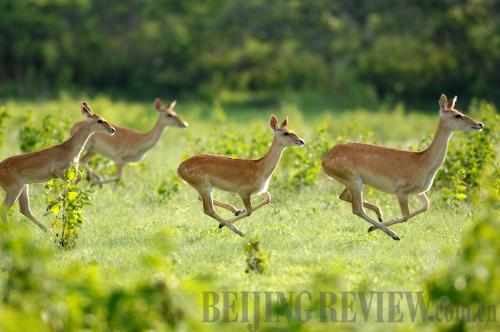|
 |
|
WILDLIFE HAVEN: Eld's deer wander in Datian National Nature Reserve in south China's Hainan Province (JIANG ENYU) |
At a section of the Yangtze River in Chongqing Municipality, huge excavators are rumbling. They dig sand from riverbed and pile it along the river banks. The sand is carried away by fleets of trucks shuttling back and forth, and later sold for profit.
This typical scene at a construction site can be seen at a number of spots in the National Nature Reserve for Rare and Endangered Fish on the Upper Reaches of the Yangtze River.
The reserve, straddling Sichuan, Guizhou and Yunnan provinces and Chongqing, covers an area of 331.74 square km. It was set up in 2000 as a refuge for fish species affected by the Three Gorges Dam.
Previously, habitat deterioration and reproduction path cutoffs wiped out species such as Yangtze River dolphin and Hilsa herring in the Yangtze River, and sharply reduced the population of other wild fish species there, experts said.
Now, waterways in the reserve are supposed to be sanctuaries to several rare fresh-water species such as the Chinese paddlefish, Dabry's sturgeon and the Chinese suckerfish.
Yet rather than living in heavenly peace, fish there are threatened by construction projects, river traffic, pollution and other hazards.
As fish forage for food in sand and lay eggs there, removing sand is tantamount to depriving them of their homes, said Fan Xiangguo, Director of the Fishery Bureau of the Ministry of Agriculture.
A powerful suction dredger reportedly can create a hole that is 100 meters in diameter and 30 meters deep in the riverbed, eliminating silt and water plants and destroying fish habitats.
In addition to sand miners, fish there face another big peril. The reserve was downsized in 2005 to give way to the construction of Xiangjiaba and Xiluodu hydropower stations.
In January, the Ministry of Environmental Protection proposed to redraw the reserve's boundaries and sought public feedback. If the proposal is approved by the State Council, the reserve will have to give away more than 14 square km to Xiaonanhai hydroelectric project, a key project in Chongqing during the 12th Five-Year Plan period (2011-15).
The proposal met strong opposition from environmental organizations.
"If a green light is given to Chongqing this time, other provinces along the reserve could always file similar requests for developmental concerns, which will endanger this nature reserve and many others in the country," said Li Bo, Executive Director of the Friends of Nature, a Beijing-based environmental NGO.
The Friends of Nature petitioned the case with the State Council on June 7. So far, the State Council had not yet made a decision on the case, said Dou Lili, a media manager of the Friends of Nature.
| 